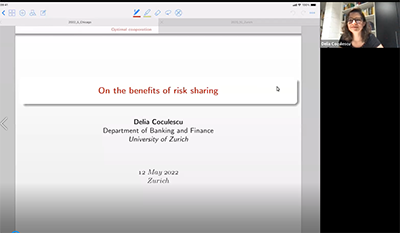Abstract
Risk sharing is fundamental to the concept in insurance; it allows the higher risks realisations of some to be offset by the relatively lower risk realisations of others. But is it true that risk sharing is always beneficial for the participants, and the more participants, the better? Using equilibrium concepts from game theory, we address this question for two different forms of risk sharing: classical risk pooling and decentralized mutual insurance. We find that the property of convexity of the total (or collective) premium is not the most natural one to use in the design of fair insurance contracts in the presence of insolvency risk. Also, contrary to common beliefs, independent idiosyncratic shocks are not always better managed in larger groups: in the case of mutual insurance, smaller groups may function better than the larger ones. This talk is based on work with several co-authors: Freddy Delbaen, Oana Lupascu Stamate, Gabriele Visentin.
